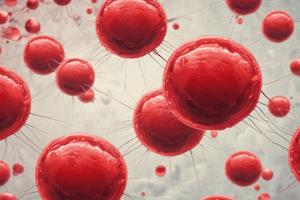Podcast
Questions and Answers
What antibodies would a person with type A blood produce?
What antibodies would a person with type A blood produce?
- Anti-A antibodies
- No antibodies
- Anti-B antibodies (correct)
- Both anti-A and anti-B antibodies
Which blood type can only accept blood from other type O individuals?
Which blood type can only accept blood from other type O individuals?
- Type AB
- Type B
- Type A
- Type O (correct)
Why are people with type O blood considered universal donors?
Why are people with type O blood considered universal donors?
- They can only donate to type O recipients.
- They have no antibodies and can receive any blood type.
- They have no antigens on their red blood cells. (correct)
- They produce A and B antigens.
What is the main characteristic of individuals with AB blood type?
What is the main characteristic of individuals with AB blood type?
What happens if a person with type B blood receives type A blood?
What happens if a person with type B blood receives type A blood?
Which blood type can receive blood from type O, A, and B?
Which blood type can receive blood from type O, A, and B?
How does the immune system of type O blood individuals respond to A and B antigens?
How does the immune system of type O blood individuals respond to A and B antigens?
What is the term used for the clumping of red blood cells due to a blood transfusion mismatch?
What is the term used for the clumping of red blood cells due to a blood transfusion mismatch?
What determines a person's ABO blood type?
What determines a person's ABO blood type?
Which blood type results when neither A nor B antigens are present?
Which blood type results when neither A nor B antigens are present?
What is the role of antibodies in relation to antigens?
What is the role of antibodies in relation to antigens?
What happens if a person receives a blood transfusion with foreign red blood cell antigens?
What happens if a person receives a blood transfusion with foreign red blood cell antigens?
What does the word 'agglutination' literally mean in its Latin roots?
What does the word 'agglutination' literally mean in its Latin roots?
Which of the following statements about red blood cell antigens is true?
Which of the following statements about red blood cell antigens is true?
Which of the following accurately describes erythrocytes?
Which of the following accurately describes erythrocytes?
Flashcards are hidden until you start studying
Study Notes
Red Blood Cell Antigens
- Red blood cells, also known as erythrocytes, contain proteins on their plasma membrane that are genetically determined.
- These proteins are called red blood cell antigens, and they trigger the immune system to produce antibodies against foreign antigens.
- Agglutination is the clumping together of red blood cells, which can occur due to the reaction of antibodies to foreign red blood cell antigens during a blood transfusion.
ABO Blood Group System
- This system classifies blood based on the presence or absence of A and B antigens on red blood cells.
- Individuals inherit these antigens from their parents, determining their blood type:
- Type A: Inherits only A antigen.
- Type B: Inherits only B antigen.
- Type AB: Inherits both A and B antigens.
- Type O: Inherits neither A nor B antigens.
- Your body produces antibodies against the antigens not present on your red blood cells. For instance, individuals with Type A blood will produce anti-B antibodies.
- This is important for preventing the immune system from attacking its own blood cells.
Blood Type Compatibility
- Type B blood produces anti-A antibodies, which would react with Type A blood, causing agglutination.
- Type O blood produces both anti-A and anti-B antibodies, making it incompatible with Type A, Type B, or Type AB blood.
- Type AB blood does not produce anti-A or anti-B antibodies, making it compatible with all blood types.
Universal Donor and Universal Recipient
- Type O blood can donate blood to any blood type, making it the universal donor, as it lacks A and B antigens.
- Type AB blood can receive blood from any blood type, making it the universal recipient, as it lacks anti-A and anti-B antibodies.
Studying That Suits You
Use AI to generate personalized quizzes and flashcards to suit your learning preferences.



